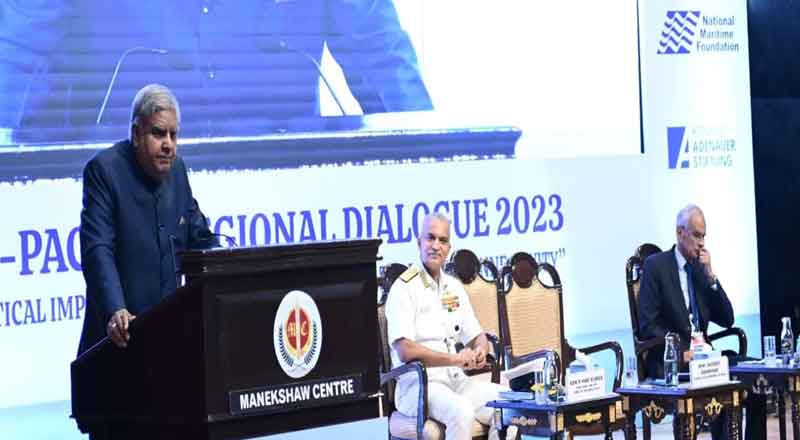Good afternoon to all of you!
When I release the book, I remember my days as Governor State of West Bengal for 3 years so I called ‘nomaskar’ greetings to all of you.
Admiral R Hari Kumar, Chief of Naval staff, Indian Navy. In his discourse he has traversed nearly everything and leaving nothing much for me to reflect. He is a domain expert I am not one. You all can delve deep at micro level and I see things only at the the macro level from a distance. So for me the discourse was a learning lesson; but I will share it with you, defence had been my first love and that’s how I had came to be admitted to Sainik School Chittorgarh. I did qualify but my right eye did not help me much so I have to take the other stream.
Admiral Karambir Singh, Chairman National Maritime Foundation, as a matter of fact when both of them were there to receive me I congratulated both of them for having great names. One is Hari, the other believes in Karam so Karambir.
Vice Admiral Pradeep Chauhan, Director General, National Maritime Foundation.
I recognise the presence of admiral Sunil Lamba 23rd chief of Naval Staff Indian Navy, distinguished audience and I know everyone in this room has domain expertise, everyone in this room is a nerve centre and epicenter to catalyse affirmative situations for larger Welfare of humanity.
Greetings to the distinguished participants and I gather one session is already over. This is an important dialogue from every perspective
Congratulations to the Indian Navy for organising this interaction amongst stakeholders and strategic think tanks on an issue that is of critical relevance for the peace and stability of our neighbourhood. This is vital for growth and prosperity of Bharat. This is contemporarily very relevant given the situation we all are facing at global level and the challenges that come with it.
The theme of the deliberations -“Geopolitical impacts upon Indo-Pacific Maritime Trade and Connectivity” is indeed apt and timely. We are already feeling the impact at global level when these things are not very secure.
Much is happening amongst 38 countries of India and Pacific region, comprising Africa, Asia and Oceania.
This region, home to 64% of the global population, contributes 62% of the Global GDP.
50% of the Global Trade and 40% of Oil passes through Indo-Pacific region and that in the context of Bharat includes 90% of our trade and 80% of our critical freight- Coal, Petroleum and Gas, Iron Ore, Fertilizers etc.
With 2.4 Million Sq Km of Exclusive Economic Zone –EEZ and this zone has huge potential and any potential exploitation comes with challenges, India has serious stakes in the peace, prosperity and stability of Indo-Pacific region to ensure maritime trade security.
Indeed geopolitical scenario is of dominant importance and its impact on Maritime Trade and Connectivity cannot be overstated more so in the current times.
Friends, our growth trajectory is continually incremental in last few years. We as a nation are currently positioned as fifth largest global economy, having overtaken in 2022 the UK and France.
By 2030 the nation is poised to be third largest global economy, this time overtaking Japan and Germany.
As India’s Economic prowess grows, dotted with phenomenal growth and deep technical penetration, which has been globally acclaimed during G20, so do our stakes in global and regional affairs as also challenges.
This dialogue this year is fourth in the line. We have had Raisina Dialogue, 2023 with theme “Provocation, Uncertainty, Turbulence: Lighthouse in the Tempest”; the Indo-Pacific Army Chiefs’ Conference hosted first and the recent the Chanakya Defence Dialogue. And now this one.
This platform is eminently suited to meticulously analyse the complexities of security challenges in the Indo-Pacific and define a way forward stance for collective security within the region so that there is blossoming environment for trade in this region.
The people present here will find the way out and there is urgency to have a way forward, given the cliff hanging situation we are facing.
It is a matter of satisfaction that Bharat, home to one sixth of humanity, is rightly coming into its own as epicentre for deep and thoughtful ideation of issues concerning global security and trade. This is a sea change from past. Such events were not happening earlier. Convergence of human minds, getting together of human resource to address issues of regional and global nature in Bharat indicates the change that is taking place in the global geo-political scenario.
These dialogues afford an impactful platform and valuable opportunity of involved interaction amongst informed minds and scratching beyond surface issues connected to defence, strategy, and collaborative partnership. All vital to maritime trade and connectivity.
An expected outcome would be forging and convergence of all stakeholders to secure stable and prosperous future in the vibrant landscape of the Indo-Pacific by ensuring peace. This landscape has enormous potential to enhance economies of the world. All the countries make our live much better. Therefore, it has importance of on its own. We need to engage quite seriously to ensure it.
In your deliberations there would be obvious focus on evolution of a strategy for security measures in the region to fortify India’s position as a ready, resurgent, and relevant stakeholder among the nations of this region. As a matter of fact India has believed historically and practised over centuries such kind of connectivity and trade through the seas.
The conception of an Ideation Forum to dissect contemporary challenges to maritime trade and connectivity in the Indo-Pacific is indeed thoughtful; particularly given the explosive global scenario with many a cliff hanging situations that potentially can derail smooth sailing of trade and maintenance of connectivity in the Indo-Pacific region.
India as a nation can be singled out as being a consistent proponent of peace, never having engaged in expansion. And this was signalled few years back by PM Narendra Modi that this is not an era of expansion.
Our firm commitment to ‘Vasudhaiv Kutumbakam’ – essence from our Upanishads – the concept of ‘One Earth, One Family, One Future’, that was indicated during G20, embodies both, our way of life as also our global outlook.
Today’s India while cherishing and practicing the principle of ‘Vasudhaiv Kutumbakam’ also subscribes to securing noble aspirations in strength. These great ideals these great desire that are wholesome for entire humanity, get meaning in physical terms only when you elucidate them from a position of strength. This has also been indicated by Chanakaya, Swami Vivekanand ji, a global icon from this land. Your strength will define global order, your strength will define peace.
Friends, emergence of Bharat as a leading global economy coupled with its phenomenal growth is a stabilising factor for global peace and harmony. I say so because just a decade ago Bharat was counted as one among the 5 fragile economies of the world. We have come a long way. Presently, to the extent of size of this economy is concern, we are the fastest growing and therefore India has to play a critical constructive role to ensure that we lead from the front to ensure a global order.
I had indicated earlier, and I reiterate that you cannot enforce peace, you cannot negotiate peace, you cannot aspire peace from a position of degrees. You have to be strong in all the parameters. India in current scenario is imminently suited for it, because growth story of Bharat is like a plateau. The development is concerning all at all level. Peace is not an option. It is the only way. Its disruption leads to human misery and global challenges.
There is a concurrent need therefore to revisit the metaphysics of the international system and debate as to how to strengthen deterrence and re-vitalise diplomacy in imaginative ways to contain and resolve conflagrations.
The world presently is facing two important configurations and the tunnel does not show light on any of these at the moment. The humanity is looking for the light at the end of the tunnel. That unfortunately is not visible. And therefore you as experts, you as concern, will have to think out-of-the-box to find a solution. And awareness and awakening is one facet with such dialogues which really can capitalize.
Collaborative security and innovative partnerships seem to be the way forward, and perhaps the only way.
And I have no doubt with my limited experience in this position that this is the only way out. No country can stand alone there will have to be action in togetherness, there will be sharing of thought processes there will have to be full application of mind to be on same page on certain issues. It was indicated by Mahatma Gandhi ji that the world has everything for everyone needs but not for greed. Greed of an individual can be contained by regulatory mechanism but greed of a sovereign nation can be contained only when other sovereign nations come together, find a way out, have a platform and a platform has to be impactful. I have no doubt in sharing my pain and anguish that if 1/6 of the humanity is not represented in the United Nation security Council, certainly it’s efficacy is down sized, time has come when we need to focus on that also.
Emerging deep technologies like AI, robotics, quantum, semi- conductors, bio-tech, drones and hypersonics are not only re-writing the very character of war – prowess and mastery of these domains will determine the strategic haves and have nots of the future. There is a paradigm shift now and that is discernible in Indo-Pacific region. Their deployment is possible either way and their has to be our preparedness to use them in a positive sense, to ensure enforcement of a global order.
To meet such like challenges, along with structural corrections, we need a series of cultural transitions: new talent pipelines and civil-military fusion seem to be the new mantras.
I would add one more to this. All research has been funded by large corporates in the developed World. Corporates of countries like Bharat also need to come forward, converse on the same table, have complete fusion with civil and military forces. To evolve such Technology already steps have been taken by Bharat and it is one of the few countries that have focused on these destructive Technology like Quantum computing and artificial intelligence.
Friends, our prime minister has reflected in last several years, his vision commitment with respect to this region in particular with several Global forum.
We are actively looking at seas as a crucial frontier of our growth. India has launched ambitious Sagar Mala Project for Port led growth. The project will increase our Logistical efficiency and reduce the cost of our Supply Chains.
But all these can fructify into positive results when there is no disruption and that is the subject you all grappling in your deliberation for next 2 days to follow
Four new Mega Ports and a World Class Trans-Shipment Port are proposed under Sagar Mala. The capacity of existing Ports and their infrastructure and linkages with hinterland is being strengthened, under the Project.
Our Indo-Pacific Policy complements the Port-led Sea-ward development strategy under Sagar Mala Project.
Not only the Physical connectivity but also the safety of under-water Cables and Pipelines for Digital and Energy connectivity is essential for the development of this entire region.
And look at the kind of data that is getting transported by these connecting mechanisms. This is our reality, this disruption can therefore lead to serious consequences, compromise security and jeopardize Maritime trade and totally bring at note the connectivity aspect.
Secure digital communication links between the Ports located around the Indo-Pacific region is essential for the growth of marine trade in the region.
In fact, the sea itself is a source of immense unexploited wealth. Besides trade and marine fishing, off Shore Petroleum reserves, critical Rare Earths elements and minerals like Yttrium, Scandium etc. lying on the deep sea bed, make Seas the new frontier for contestation among global players. To contain the possibility of contesting claims of the Seas and its assets, we need a regulatory regime and its effective enforcement.
As the fastest growing economy, India seeks a free and peaceful rule-based Indo-Pacific region with open and unrestricted flow of lawful legitimate commerce. We seek freedom for navigation and overflight in accordance with established international Laws and Conventions.
The problem arises when there are transgressions, the mechanism fails. Neither there is immediate resolution nor does no one know when the resolution will come. I am sure deliberation at your level, when the domain experts are involved, there will be awareness generated that this location of such kind of mechanism leads to serious economic consequences that visit humanity with serious consequences including that of anger.
We seek a just global regulatory regime that respects the right over EEZ, for the sustainable and equitable exploitation of marine resources and Sea-bed in high seas.
I am not an expert but I can indicate to this August house this is going to be real area of contestation because the regulatory regime is yet to crystallize itself to a final point such kind of think tanks can focus on these areas, evolve a mechanism which does not lead to undefined grey area.
Free and Open Seas must guard against illegal human and narco trafficking. Piracy and sea-borne terrorism cannot be allowed in a Rule-based Regime that must respect territorial integrity of the countries and inviolability of their EEZs.
It is reassuring to know that our Navy has the Skills, Motivation, the might and the Resources to secure our long Coast Line and our marine interests.
My salutations to the men and women in white. I have tested there they have done remarkably well. I tested there prowess, power and commitment when I was Governor State of West Bengal. They ensure that when we were visited with super cyclonic disaster, there was no mortality on high seas and the damage was minimise by a robust mechanism. My salutations to them.
With Indo- Pacific region becoming a prominent pole in global economic order, it is important that the region remains peaceful, stable and free from contestations.
While Indian Navy, in close coordination with other Navies of like-minded friendly countries, is always prepared to secure common good, platforms like the Indo Pacific Regional Dialogue provide the opportunity to build an academic consensus for a peaceful, rule-based Marine Order.
I trust that your deliberations over next three days across six professional Sessions will help build such a consensus.
If there is a mechanism evolved that you generate awareness, I am sharing with you with my limited experience that those who thinks are fully alight to the problem, your assumptions may not be correct, those who are in the seat of decision making need to be educated. Sometimes awakened and awareness generator and therefore your role of such a think tank will go long way in securing a global order that will conserve, sustain and bring about peace in the world.
I thank you for giving me opportunity to share my impressions with such an august audience on this very topical issue.
Again I reflect I am not an expert, you all are experts, you are domain experts. I can only have macro view, you will have micro view, but I can express my hope, optimism and confidence that if such think tanks remain active, functional, generate awareness, give reports that can be considered by the executive, by the legislature, by civil and military dispensations, we are assure of global peace and order and a global economic growth for one and all.
Thank you so much!
Jai Bharat!





